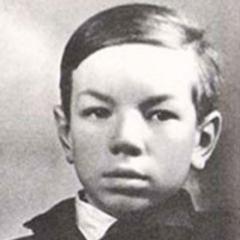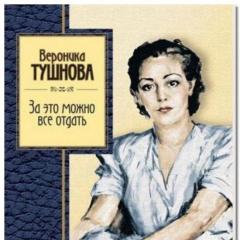I love you. Kohannya yet? Buti can. Added. Detailed analysis of Pushkin’s poem “I loved you, Lyubov may not have completely died out yet”
/ [I loved you. I was either afraid or jealous. Love, perhaps, has not completely extinguished in my soul.]
Text of the song - [I loved you. I was either afraid or jealous. Love, perhaps, has not completely extinguished in my soul.]
(The words of the song and the text of the song): lovingly, perhaps,
My soul was not completely extinguished;
Hello, he won't bother you anymore;
I don't want to bore you with anything.
I love you madly, hopelessly,
Now I’m afraid, now I’m tormented by jealousy;
I love you so deeply, so tenderly,
May God grant you to be different.
Translation of the song - [I loved you. I was either afraid or jealous. Love, perhaps, has not completely extinguished in my soul.]
(Translation of the text of the song by Anna Gusti. - [I loved you. I was either afraid or jealous. Love, perhaps, has not completely extinguished in my soul.] English #english version, English version): love is, perhaps,
In my soul died not quite;
But let it you are no longer worried;
I don't want to sadden you anything.
I loved you silently, hopelessly,
The shyness, jealousy tormented;
I loved you so sincerely, so tenderly,
As God gives you his beloved to be different.
Look more popular lyrics and translations by Anna Gusti.:
- Anna Gusti. - [I loved you. I was either afraid or jealous. Love, perhaps, has not completely extinguished in my soul.]
You don’t know who sings the song [I loved you. I was either afraid or jealous. Perhaps love has not completely died out in my soul.]? The answer is simple, that's Anna Gusti.. Finding the words to the music, the text of the song and sometimes finding the chords is not difficult here, so to know the song behind the words, you need to enter a couple of words from the song into the search and press the search button. You can now vicorista text And the words of this song in karaoke or just listen by turning off your mp3 player. There is no need to try to translate the song into Russian or into English, translation of the song by Anna Gusti. - [I loved you. I was either afraid or jealous. Love, perhaps, has not completely extinguished in my soul.] It’s already on textpisni2.ru, and you can download the text of the song lyrics You can see him with a bear.
Looked at Anna Gusti for the whole hour. - [I loved you. I was either afraid or jealous. Love, perhaps, has not completely extinguished in my soul.]:
“I love you: kohannya sche, perhaps...” Oleksandr Pushkin
I love you: kohannya sche, perhaps,
My soul was not completely extinguished;
Hello, he won't bother you anymore;
I don't want to bore you with anything.
I love you madly, hopelessly,
Now I’m afraid, now I’m tormented by jealousy;
I love you so deeply, so tenderly,
May God bless you and be different.
Analysis of Pushkin’s poem “I love you: now, perhaps...”
Pushkin's love poetry contains dozens of verses written at different times and dedicated to several women. It seems that he sings to his own words, expressing his strength and tenderness, before the skinny woman the author admires her beauty, intelligence, grace and extremely captivating talents.
In 1829, Alexander Pushkin wrote, perhaps, one of his most famous works, “I love you: now, perhaps...”, which then became a talent. Historians are still arguing about those to whom this message was addressed, the fragments are neither in dark notes, nor in the pure version, he sings without depriving the thirsty pressure on those who are the secret unknown, which breathed into his creation. In one of the versions of literary scholars, the verse “I love you: I love you now, maybe…”, written in the form of a farewell sheet, is dedicated to the Polish beauty Karolina Sabanski, whom she sings when she met in 1821 Pivdennogo sent. After suffering from a fire, Pushkin visited the Caucasus and, on the way to Chisinau, stopped in Kiev for several days, where he made representations to the princess. Regardless of those who were 6 years older than the singer, her marvelous beauty, grace and pride brought an unforgettable admiration for Pushkin. Two years later, they were destined to study again, but this time in Odessa, where the poets seemed to burn with new strength, but they were not attracted to each other. In 1829, Pushkin’s family began to visit Karolina Sabanska in St. Petersburg and marveled at how old and deteriorated she had become. Despite the great passion that he sings to the princess, not a trace is lost, and the answer to the riddle about the great amount of passion he seems to create is the verse “I love you: I love you now, perhaps...”.
For another version, this one is addressed to Anna Oleksiivna Andro-Olenina, and also to the Countess de Langeron, whom she met in St. Petersburg. The poet was filled not so much with her beauty and sophistication, but with her witty and appetizing wisdom, and also with the winefulness with which she parried Pushkin’s fiery remarks, both teasing and annoying. A lot of people from the sharpness of the singer were convinced that there was a turbulent romance with the beautiful countess. However, according to the assertions of Pyotr Vyazemsky, Pushkin did not create the appearance of an intimate relationship with the well-known aristocrat, since on her side he could not be expected to be confirmed. There was a tense exchange between the young people, and the countess admitted that she had a friend and a sick septic. As a result, the world of verses appeared: “I love you: love, perhaps...”, which says goodbye with its own greeting, singing from someone who says that no love will “turbate you anymore.”
Varto also notes that in 1829, Pushkin first became acquainted with his future squad, Natalya Goncharova, who fought against his unforgettable enemy. His hands are being touched, and on the ashes of the new burial, rows are being written about those that the khan “in my soul has not completely died out.” But there is no such thing as a great passion, which brought the poet’s mass of tender and painful convulsions. The author is revealed to a secret stranger that she “loved hopelessly, hopelessly,” which ambiguously indicates Anni Oleksievna’s marriage to Andro-Olenina. However, in the light of a new love crush, he sings, it seems likely that he will not try to appease the countess, but in this case, as before, he feels even tender and warm to her. This itself can explain the remaining stanza of the verse, in which Pushkin says in his own words: “So may God grant you to be different.” Tim himself sings about the conclusion between his bitter romance, hoping for a love affair with Natalia Goncharova and hoping that the one to whom this verse is addressed will also be happy.
Alexander Pushkin
I love you: kohannya sche, perhaps,
My soul was not completely extinguished;
Hello, he won't bother you anymore;
I don't want to bore you with anything.
I love you madly, hopelessly.
Now I’m afraid, now I’m tormented by jealousy;
I love you so deeply, so tenderly,
May God grant you to be different.
Ivan Bunin
A calm look, like the look of a deer,
And everything that I love so tenderly,
I still haven’t forgotten in the confusion.
Alas, your image is now in the fog.
And there will be days of darkness and turmoil,
And I fall asleep in good times,
There is no longer happiness, no suffering,
And only the all-forgiving distance.
Josip Brodsky
From "Sonnets of Mary Stuart"
I love you. Kohannya (possibly,
It’s just a matter of drilling my smudges.
Everything went to pieces.
I tried to shoot myself, but it’s not easy
I'll save it. And further: whiskey:
which one to hit? Psuvala is not three thousand, but
thoughtfulness. Damn! Everything is not human!
I love you so much, hopelessly,
God forbid you otherwise - otherwise he won’t!
Vin, being richly promiscuous,
do not create - for Parmenides - two
this heat in the blood, this wide-acid crunch,
so that the fillings in the pasta melt into sprague
stick around - “bust” I’ll cross it - wust!
Oleksandra Levin
Versh, writing for additional programs Russian word constructor
I'll club you. Vedmedic Club
I have a load of sour dogs,
Ale pasta, you won’t get any better.
I don’t eat anything hot.
I’m not framing you with my lies.
Penyurs of your conscripts
I don’t want to make trouble, like a frown is pouring,
It's all nonsense.
You are nothing, no one is a turbidity.
There is a landmine in my chest, but not at all.
Oh, I’m sorry!.. I, efirat in the world,
I’m stealing a new story for you!..
I curled you up so flutely and corporeally
sometimes I'm tired, sometimes I'm tired of my mind,
I curled you up so hotly and lusciously,
as an ensign in your hands, we are naked but otherwise.
Fima Zhiganets
I'm trying for you; maybe when I arrive
I haven’t quite gotten ready yet;
Otherwise I won’t pump under the murkovodka;
In short, apparently - a bunch of stars.
I compete with you without tavern pomp,
Now under the jacks, now at the jitters;
I'm fighting for you without any bullshit, like a brother,
How the hell do you want to compete with you already?
Kostyantin Wegener-Snaigala
Ministry of Literature of the Russian Federation
Vih. №_____ dated 10/19/2009
To the Intercessor of the Head of the Department of Nathnennaya Mrs. ***
Poyasnyuvalna
I would like to inform you that this entire process is entirely yours. It is clear that this process has recognized the extinguishment in my soul as not a complete peace. Due to the thyroid problem, I ask you to ignore any possible alarming symptoms until the process continues. I guarantee that we will try to overcome insecurity in the form of sadness in any way accessible to me.
There is a need to clarify that this process took place in the minds of melancholy, as well as hopelessness, accompanied by such phenomena as, alternately, fear and jealousy. Before this process, I acquired such traits as thickness and tenderness. In summary, let us consider the importance of the adequacy of the further development of one hundred percent of your processes, similar to the above-mentioned one, on the side of third parties.
With respect,
Head of the Literary Innovation Department Pushkin O.S.
Vic. Shaft I.I.
Yuriy Lifshyts
I washed for you; still a stickler, in real life,
My brain is no longer widening in the wilderness;
Otherwise, I won’t get into trouble with you;
Fuck you, I'm very empty.
I washed for you, squirming in the cold;
Either chasing the storm, then throwing myself into the smoke;
I washed for you, without fussing with hairdryers,
It’s like an ensign at hand for you to wash with others.
I love you: the chaos, perhaps, in my soul has not completely died out; Hello, he won't bother you anymore; I don't want to bore you with anything. I love you soullessly, hopelessly, I am now afraid, now I am languidly jealous; I love you so deeply, so tenderly, May God grant you to be different.
Versh “I love you...” dedicated to the bright beauty of that hour, Karolina Sobanskaya. First, Pushkin and Sobanska met in Kiev in 1821. She was older than Pushkin by 6 rocks, then the stench began to grow after two rocks. She sings with passion for her laughter, but Caroline played yogo almost. The social leftist was fatal, as she brought Pushkin to ruin with her play. The rocks have passed. He sings, trying to drown out the bitterness of the undivided, with the joy of mutual love. The miraculous mitya was washed in front of him by the charming A. Kern. There were other burials in his life, but a new meeting with Karolina in St. Petersburg in 1829 showed how deep and inseparable Pushkin’s love was.
Versh “I love you...” - this is a small story about an undivided family. It impresses us with its nobility and genuine humanity. The undivided congregation sings, freed from all egoism.
Two messages were written about the broad and the deep in 1829. In the sheets to Caroline Pushkin knows that having felt all the power she has over herself, moreover, she demands that she has known all the shocks and torments of love, and to this day she feels a fear of her that cannot be under olati, and good news about friendship , like a pragne, like a foal, which has a discount.
Knowing that his lament is even more banal, he continues the blessings: “I don’t need your closeness,” “my life is different from yours.”
The lyrical hero is a noble, self-motivated person, ready to deprive her kohan of her wife. Therefore, the top of the permeation of the seemingly great love in the past and streaming, more detailed installations for the poor woman in the present. It’s right to love this woman, to think about her, not to be turbulent and to embarrass her with your knowledge, I hope that love before her future form would be as broad and tender as love sings .
The versh is written in double-folded iambic, the rima is crossed (1st – 3rd row, 2nd – 4th row). Among the image-creating abilities of Versha, the metaphor of “love has died out” is used.
01:07
Virsh A.S. Pushkin “I love you: lovingly, perhaps” (Virshi Russian Poets) Audio Vershi Hear...
 01:01
01:01
I love you: the chaos, perhaps, in my soul has not completely died out; Hello, he won't bother you anymore; I don't...


